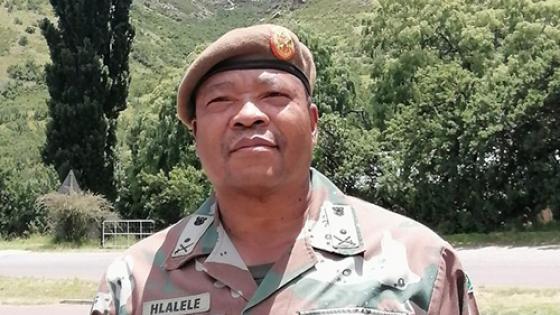Why studying Defence Management and Security matters
Speaking to Brigadier General Molefi Hlalele felt like a crash course in understanding the significant role played by the South African National Defence Force (SANDF).
Hlalele, having served in the military for more than three decades, graduated with a Postgraduate Diploma in Management in the field of Security in 2018 at the Wits School of Governance. Prior to this qualification, he completed a Diploma in Military Operations in 2013 at the SA War College.
Hlalele’s commitment and dedication to the military, whose purpose is to defend South Africa against external military aggression, was palatable throughout the interview. His journey started as early as Grade 7 in school where he demonstrated natural abilities for maths and science, which eventually attracted bursary opportunities to study in London. However, he gave up the opportunity to study abroad and enrolled in the army after completing school in the Free State, he thought he would stay for two years only but 30 years later he still serves South Africa with pride.

“The discipline to succeed in life is what attracted me to army life. Being a part of the armed forces requires you to be continuously disciplined and work in a team.
“When your teammate doesn’t the have energy to carry their bags, you help them until they recover completely. You leave no person behind,” explained Hlalele.
Initially the Brigadier General competed with more than 10 000 people for 130 spots. The physical and mental training during the selection is a series of excruciating exercises over a period of three weeks, leaving trainees with only two hours of sleep on some days. “That’s if we were lucky,” joked Hlalele. Thereafter the final number of 150 instead of 130 recruits were identified and he was part of that required number. The mental aspect of serving in the armed forces shouldn’t be underestimated because death is a quick and sudden reality.
His propensity for leadership meant that Hlalele climbed up the ranks quickly early on his career. He was only one of two soldiers that was selected for advanced leadership training out of 150 people.
Hlalele quickly gained experience on the ground and on missions to countries including the Kingdom of Lesotho, Mozambique, Burundi, Democratic Republic of Congo and Darfur, Sudan. These were missions that required agile decision-making and strong leadership.
The Brigadier General explained how South Africa navigates through a spectrum of conflict.
“Before one country can go into war with another, there is political or defence diplomacy between them to resolve their issues. But there is also a situation where there are warring factions within the same country. The same procedure would apply as well, diplomacy, to resolve that each force to occupy their territory and peacekeeping operations will continue as agreed during diplomatic discussions. The foreign militaries will operate between them to establish buffer zone. The situation can change from peacekeeping to peace enforcement (using weapons) so that warring parties can comply to the agreements and then thereafter reconstruction and development phase takes over under the civilian authorities.
“Here SA’s Department of Trade and Industry can get involved during reconstruction and development phase in that country. For example, they will bring in giant retailers like Woolworths and Shoprite/Checkers to assess the viability of operating in these countries. We would also facilitate the Department of Agriculture as well offering some expertise,” he explained.
Studying at WSG has afforded Hlalele to gain academic knowledge about his work.
“No one teaches you about the resources within the defence industries. When we work with Armscor and Denel for example, we realise the research capabilities of weapons sit with them. At WSG, we are taught about how these companies and the industry operate. In this way, we can also promote the quality of weapons produced by South African companies in other countries,” Hlalele said.
He explained that of Armscor get orders, it means work for South Africans and more families can be supported. These are examples of how the military plays a role in making economic contributions to our country.
“We also learn about methodologies used to rate militaries – here academics can study and write about these things and ask questions about the criteria because recently, the global ranking of militaries came into question. For a while South Africa was ranked number one for its military on the continent but now its number two after Egypt.
“We grow our research skills and understand the importance of feasibility studies. We are used to working on an operation level but here at Wits we learn the other side of what we do, which puts us in a position to do consulting work.
“WSG has academics and some have been in the field and understand our operational challenges. This makes learning robust and fascinating, we can debate and explain to the academics who may not have been on the field the realities our of work so that there is balance between academic and practicalities.”
“I have been promoted to a rank of a brigadier general partly because of my qualifications I received from University of Witwatersrand. One of the modules on public policy helped me become a diplomat”. He served as a diplomat to SADC in Botswana.
The Brigadier General is also a published author, public speaker on leadership and motivation for both local and international audiences.
His books are titled No Retreat No Surrender: Life and leadership lessons from a militaryman and Rising to the occasion: Reflections on leadership by a field commander. These books can be purchased at Amazon, take-a-lot, Exclusive books and Protea Huisboek.
He has begun a new journey in academic research and writing academic articles. This year, he presented his academic paper at University of Zululand titled “The unintended consequences of social grants in South Africa: a clamp of protest action” and “Breaking the cycles of poverty”. His intention is to complete his studies at WSG ,including studying towards a PhD.




